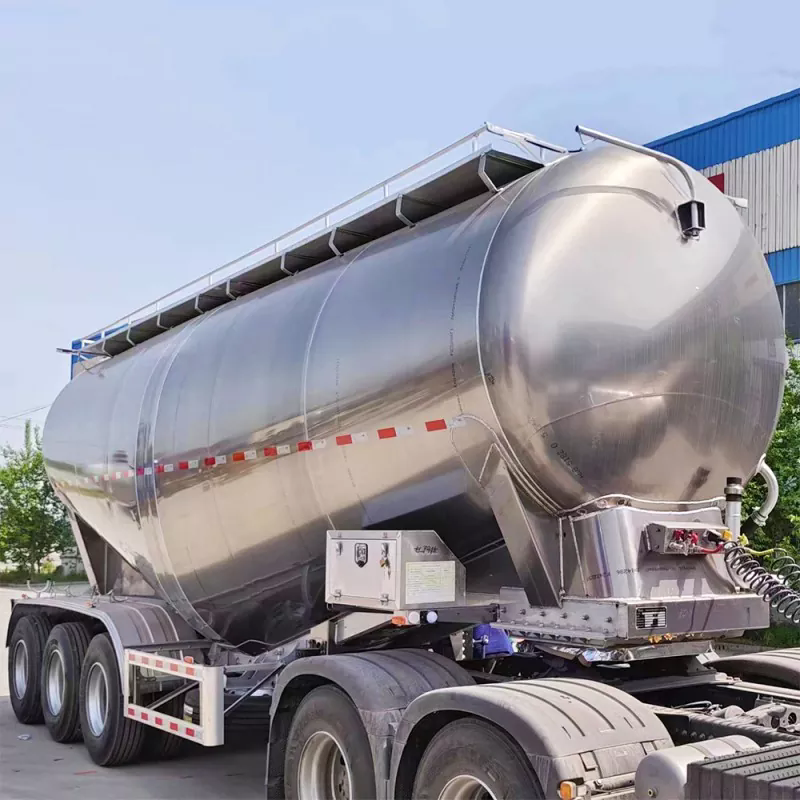Cement Tank Trailers: The Efficient Solution for Bulk Cement Transportation
2025-06-09
In the construction and infrastructure industries, the reliable and efficient transportation of bulk materials is essential. One of the most critical tools for moving powdered cement over long distances is the Cement Tank Trailer. Also known as a bulk cement trailer or dry bulk tanker, this specialized vehicle ensures that cement is delivered safely, cleanly, and cost-effectively.

What Is a Cement Tank Trailer?
A cement tank trailer is a type of semi-trailer used to transport dry powder materials such as cement, fly ash, lime powder, and other similar bulk goods. These trailers are typically constructed with carbon steel, aluminum alloy, or stainless steel and feature an enclosed tank structure with high-pressure air systems to facilitate unloading.
The tank is designed to be airtight and weather-resistant, ensuring that the cement remains dry and uncontaminated during transit.
Key Features of Cement Tank Trailers
Large Carrying Capacity
Available in sizes ranging from 25 to 65 cubic meters, these trailers offer efficient high-volume transportation, reducing the number of trips required.
Pressurized Discharge System
Using compressed air, the trailer can unload cement directly into a silo or storage unit without spillage or manual labor.
High-Strength Steel or Aluminum
Durable construction ensures long service life and resistance to wear, corrosion, and mechanical damage.
Multiple Compartments (Optional)
Some models feature compartments for transporting different materials at once, increasing operational flexibility.
Aeration System
The bottom of the tank includes fluidized bed systems that help loosen and discharge the cement smoothly.
How Does a Cement Tank Trailer Work?
1. Loading
Cement is loaded through one or more top hatches using a pneumatic conveying system or gravity flow from a storage silo.
2. Transport
The trailer maintains a sealed environment to protect the cement from moisture and air exposure.
3. Discharge
Compressed air is pumped into the tank, fluidizing the cement. The pressurized material is then discharged through the pipeline into a silo or construction site storage tank.
Common Applications
Cement tank trailers are widely used in:
Cement manufacturing plants
Ready-mix concrete batching plants
Large-scale construction projects
Mining and industrial zones
Their ability to transport dry bulk materials efficiently makes them indispensable for time-sensitive and large-volume operations.
Choosing the Right Cement Tank Trailer
When selecting a cement tank trailer, consider the following:
Tank Volume: Based on your typical load and travel distance
Axle Configuration: 2, 3, or 4 axles depending on your region’s road regulations
Material Type: Aluminum for lighter weight and fuel savings, steel for durability
Discharge Efficiency: Higher air pressure and better aeration systems improve unloading time
Local Compliance: Ensure the trailer meets local transport and safety regulations
Maintenance Tips for Cement Tank Trailers
Clean the tank regularly to prevent cement build-up
Check air compressors and valves for leaks or malfunction
Inspect tires, axles, and brakes to ensure safe road performance
Lubricate all moving parts for smooth operation
Replace worn aeration pads and filters as needed
Proper maintenance ensures long service life and reduces the risk of costly downtime.
Final Thoughts
Cement tank trailers play a crucial role in today’s construction supply chain. Their efficiency, large capacity, and automation-friendly unloading make them the ideal choice for bulk cement transport. Whether you're a construction contractor, cement supplier, or logistics operator, investing in a quality cement tanker can boost your productivity and bottom line.
Looking for a high-performance cement tank trailer?
We offer customizable models built for durability, efficiency, and regional compliance. Contact us today for technical specs, pricing, or a tailored solution for your transport needs.


